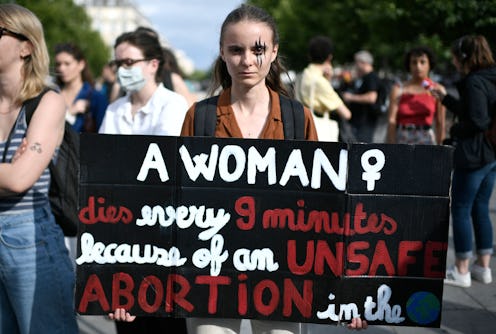(Politics)
Roe Vs. Wade Overturning — What Does This Mean For Us?
The repercussions of this landmark ruling.

In a historical move, the Supreme Court of the United States overturned a 50-year constitutional protection — under the 14th Amendment — for abortion on Friday June 24. While rumblings of efforts to overthrow the 1973 Roe vs. Wade ruling have been present for weeks, since the uncovering of Justice Samuel Alito’s draft of an opinion declaring the Supreme Court’s intention to overturn, the idea that it would come to fruition seemed beyond belief. But, alas, the devastating 5-4 vote proved otherwise.
In response to the ruling, President Biden addressed the nation, stating the Supreme Court took away a constitutional right from the American people that it had already recognized. “They didn't limit it — they simply took it away,” he said. “That's never been done to a right so important to so many Americans. But they did it. It's a sad day for the court, and for the country.”
The President also noted that the overturning means "the health and life of women in this nation are now at risk."
Indeed, many abortion supporters have spoken on the severe and long-term impact that such a decision could have on the country. In a May 2022 op-ed for TZR, writer Jennifer Wright explains, “The overturn of Roe v. Wade would mean that individual states get to determine whether women can legally have abortions there.” According to reporting by CNN, “At least 21 states have laws or constitutional amendments already in place that would make them certain to attempt to ban abortion as quickly as possible, according to the Guttmacher Institute, which favors abortion rights. And an additional four states are likely to ban abortions as soon as possible without federal protections.”
With these bans and/or restrictions, a subsequent increase in unsafe abortions is likely imminent. “In my experience it is absolutely useless to try to point out that abortion rates are approximately the same in places where it is legal and places where it is criminalized — criminalization merely makes the number of unsafe abortions rise,” states Wright.
The ruling also raises the question of a domino effect that will impact other civil rights currently protected by the Constitution, like interracial and same-sex marriage. Justice Alito’s aforementioned draft stated that constitutional rights must be “deeply rooted” in U.S. history and the nation's "scheme of ordered liberty," which puts the aforementioned civil rights on a potential chopping block.
Friday’s ruling makes voting more crucial than ever, says President Biden, who promises that Roe will be on the ballot come fall. “Personal freedoms are on the ballot,” he says. “The right to privacy, liberty, equality — they're all on the ballot. Until then, I will do all in my power to protect a woman's right in states where they will face the consequences of today's decision.”
You can also make moves moves of your own by supporting the organizations below: